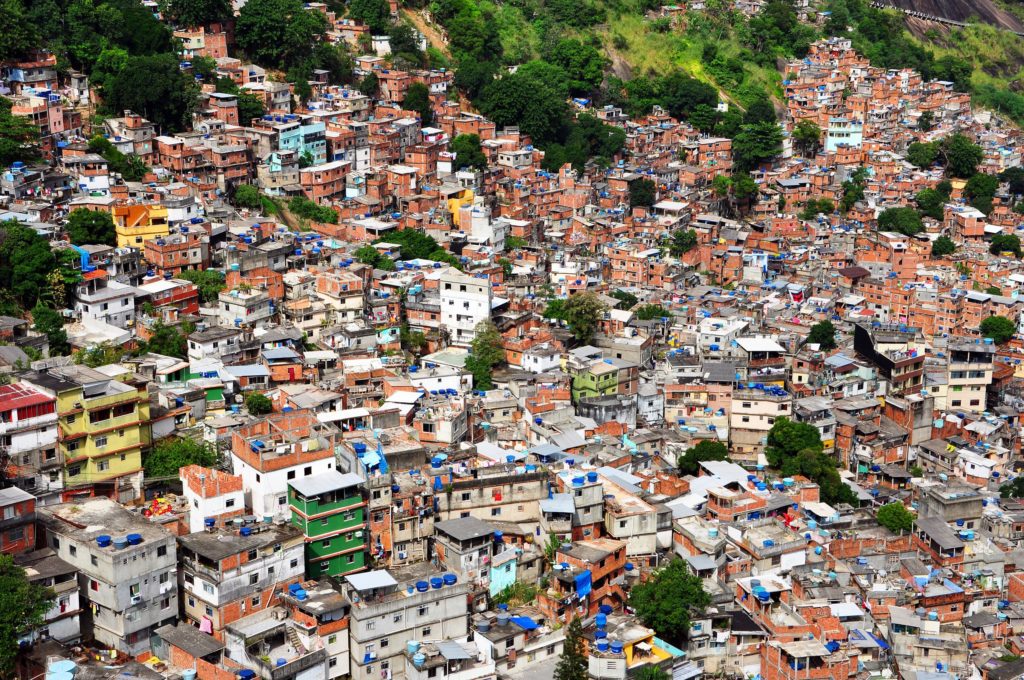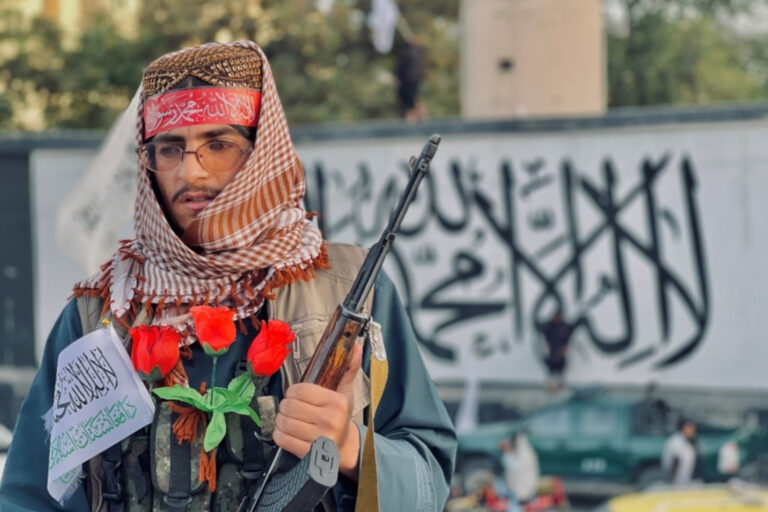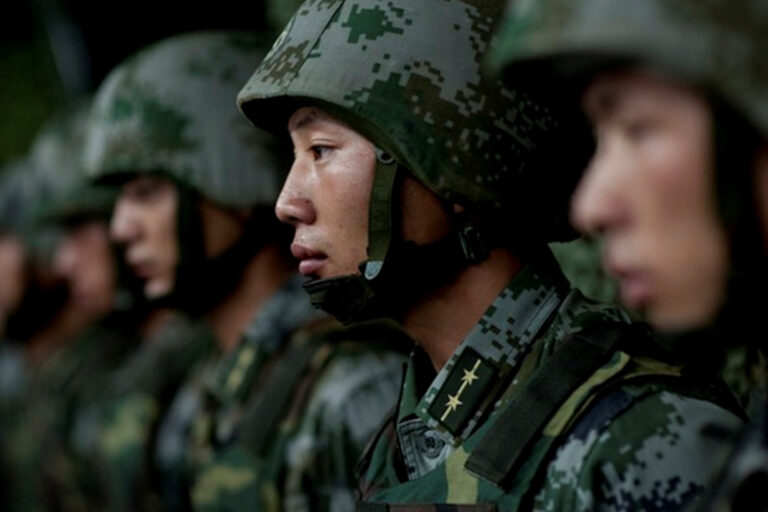Introduction
Latin America’s criminal groups have leveraged the coronavirus pandemic to win the goodwill and support of local populations by delivering humanitarian assistance and co-opting public service provision in communities underserved by state institutions. Such levels of “criminal charity” could complicate the future efforts of Latin America’s weakest states to dismantle and defeat organized crime groups, whose power has grown in recent years.
Many hoped that the social distancing measures favored by many Latin American governments to slow the spread of coronavirus would also lead to a diminution in the region’s persistent violence and criminal activity.[1] Instead, record-breaking violent crime has been recorded in countries such as Mexico and Brazil.[2] Worse yet, as government agencies scramble to tend to the many facets of the health crisis, criminal groups have stepped into the void to provide relief packages, employment, security, and even dispute resolution services.[3] Cases of criminal charity have been especially prominent in Mexico, Colombia, and Brazil.
Criminal Charity Abounds
In Mexico, the influence of its drug cartels was already on the rise after President Andrés Manuel López Obrador sought to pursue a security policy focused on tackling the social roots of violence (i.e., poverty, exclusion, low levels of educational access) rather than continue the policy of head-on confrontation with criminal organizations of his predecessors.[4] Record-setting homicides in 2019 and a number of law enforcement blunders should have forced him to reverse course.[5] Nevertheless, López Obrador’s limited action against organized crime, Mexico’s endemic state corruption, the continued demand for illegal narcotics worldwide, and a profound health crisis all provide opportunities to criminal groups.[6]
During the pandemic, Mexican cartels have dispensed food in no fewer than 11 of its 32 states and enforced quarantine in several others.[7] One video appears to show members of the Sinaloa Cartel engaged in corporeal punishment with a paddle marked “COVID-19” on a man alleged to have flouted quarantine rules.[8] The daughter of Juaquín “El Chapo” Guzmán Loera, the notorious former head of the Sinaloa Cartel, proudly distributed chapodispensas (“chapo supplies”) of foodstuffs and personal protective equipment emblazoned with her father’s visage.[9]
Slick promotional material, including aerial footage shot from a drone, captures a queue of desperate people being served with relief packages from criminal groups.[10] Carefully cultivated—and no doubt, coerced—relationships with local media outlets provide a further opportunity to shape the narrative, promote their deeds, and increase goodwill. In another advertisement, a man expresses his gratitude to Nemesio Oseguera Cervantes, head of the Cartel Jalisco Nueva Generación (and one of the Drug Enforcement Administration’s most wanted criminals), for his generosity to Mexicans in need.[11]
Elsewhere in the region, the Ejército de Liberación Nacional (ELN), one of Colombia’s oldest and most menacing guerrilla groups, has enforced the country’s quarantine, especially in rural areas, making public displays of those who disregard social distancing measures.[12] The ELN has taken advantage of the moment to increase the numbers in its ranks. Forced conscription of minors has risen 113% since the pandemic began.[13]
The Fuerzas Armadas Revolucionarias de Colombia (FARC), another active guerrilla group in Colombia, continues to push territorial gains and consolidate trafficking routes. In addition to policing the country’s quarantine, the FARC has established informal checkpoints to extort locals and control the flow of people and goods.[14] Coca production in Colombia had one of its best years on record, which means Colombia’s criminal groups have the potential to produce and traffic more cocaine than ever before.[15] Stockpiles built up before the pandemic will ensure that any downturn will have limited effects on their bottom line.
Brazil’s sundry criminal organizations have likewise imposed curfews, gone door-to-door to ensure compliance with social distancing measures, and utilized loudspeakers to promote good hygiene practices.[16] In the words of one group, they will do so because the government of President Jair Bolsonaro “won’t do the right thing.” Criminal factions have prohibited entry to some of the country’s favelas for fear of spreading the virus and to ensure their monopoly on governance.[17] By repurposing chemicals used in cocaine production, Rio-based criminal groups have provisioned hand sanitizer and other personal protective equipment to residents in need.[18]
For those left out of such provision, Brazilian criminal groups have threatened violence in an effort to control rising prices of goods on the market, especially food, hand sanitizer, and protective masks.[19] The parallel tax structure erected by criminal governance, and enforced through the act of extortion on large and small businesses alike, continues unabated.[20]
Standstill or Nimble Adaptation?
The pandemic brought widespread expectations that stay-at-home orders would reduce violent crime and potentially dry up drug markets. Supply chain difficulties ruptured imports of precursor chemicals from China and crippled production capacity. “We haven’t stopped producing,” an operative of the Sinaloa Cartel told Vice, “but the price of meth is getting pushed up because of the scarcity of chemicals from China.”[21] Transport is also expensive and riskier under significant border restrictions, complicating what used to be facile global operations. As a result of this paralysis, “The current crisis could present a unique opportunity to disrupt drug cartel activities and force criminal organizations into a corner,” the Mexican analyst, León Krauze, writes.[22]
Instead of presenting an excellent opportunity to dismantle criminal organizations, however, the pandemic has shown that not all criminal groups are created equally. Neither are all drug markets nor all trafficking routes. For instance, while drug seizures are down at US ports of entry, they have increased over 20% compared to the same period last year at European ports of entry.[23] Europe is the top destination for drugs transiting through Brazil, demonstrating that Brazilian groups are doing a brisk trade and have found a fairly recession-proof method of shipping.[24] Drug seizures have also increased dramatically at Brazilian ports of exit and land borders, indicating an adaptation by other criminal organizations to the continued success of Brazil’s groups.[25] Contraband seized at Brazil’s southern border increased 800% in the first trimester compared to the last trimester in 2019.[26] It appears as though the international cocaine market, partly owing to price inelasticity of demand (and a wealthy consumer base), was best prepared and has adapted better than any other drug market–and many other legitimate businesses–to the unfolding pandemic.[27]
Permanent or Temporary Gains?
As the COVID-19 pandemic recedes in the coming year, will criminal groups consolidate their gains or will their control eventually revert to pre-pandemic levels? The prospects are worrisome. The pandemic will decimate public coffers for years to come, which could translate into fewer (and less trained) security personnel on the streets. Many countries in Latin America have persistently underfunded the public security apparatus as a percentage of GDP.[28] Worse, these trends could coincide with a drastic rise in street crime as social distancing measures are lifted.
Even before the pandemic, the International Monetary Fund had predicted Latin America would experience woeful economic growth in 2020.[29] If Latin America’s coming economic recession is as profound as expected, economic privation could swell the ranks of criminal groups. Over the past 20 years, 100 million people in the region escaped poverty; the United Nations warns that a quarter of those could fall back into poverty.[30] In the unlikely scenario of a rapid recovery, Latin America’s sizeable informal economies create vulnerabilities and uncertainties that criminal groups will continue to exploit.[31] Even the formal sectors of Latin America’s economies are permeable as criminal groups put old skills to new uses. The desire to restore economic prosperity may lead countries to wave typical guardrails on corruption, such as protocols for procurement or awarding public contracts, opening further potential avenues for criminal groups.[32]
The coronavirus has laid bare years of chronic underinvestment and outright neglect of Latin America’s rural and marginalized urban areas. While the competition between criminal groups and the state for the provision of goods and services is nothing new, the pandemic has highlighted criminal charity as a brazen tactic by a variety of criminal groups. The coming economic hardships will continue to erode fragile and weak state’s ability to provide for the impoverished.
The vacuum in many Latin American countries has provided criminal groups ample opportunity for significant public image boosts. Specifically, it has allowed the myth of “social banditry” to persist—i.e., that criminal groups act like modern day Robin Hoods, trafficking in illicit goods only so that they can reinvest those profits into needy communities later.[33] In reality, the aim of criminal charity is not only to delegitimize the state but also to supplant its public authority by showing that criminal groups, not the state, tend to the basic needs of impoverished citizens.[34] Even worse for the prospect of rolling back these gains, governance capacities often outlast criminal groups’ actual monopoly on provision and are quite resistant to targeted state interventions.[35]
Once the pandemic recedes and countries such as Mexico, Colombia, and Brazil take full stock of the altered criminal landscape, they will likely be confronted by groups with stronger territorial claims and greater para-state capacity. The costs of losing the governance competition, or failing to compete altogether, could mean an additional hurdle for future efforts to dismantle and defeat criminal groups. Goodwill and a popular base of support for criminal groups are growing in disputed territories, possibly adding a protective layer if and when state authorities target criminal groups. The success of criminal groups’ efforts to engage in criminal charity could keep states weak for the foreseeable future and alter the fight against criminal groups in the Americas for decades to come. This brutal reality is even truer during the pandemic—cutthroat market conditions and border closures complicating international drug trafficking have forced criminal groups to become even more efficient, exacerbating the yawning gap between the efficiency and creativity of criminal groups and the state.
Criminal groups have always employed a combination of violence, threats, and “strategic magnanimity” (patronage and redistribution with a social function) to build sympathy within local populations.[36] The pandemic has opened an array of new possibilities for provisioning services to curry favor and employing violence to coerce populations. So far, criminal groups are far outpacing Latin American states in the crucial competition for millions of hearts and minds.
References
[1] Kate Linthicum, “Coronavirus chokes the drug trade—from Wuhan, through Mexico and onto U.S. streets,” Los Angeles Times, April 24, 2020, https://www.latimes.com/world-nation/story/2020-04-24/wuhan-china-coronavirus-fentanyl-global-drug-trade; Jon Kamp, “Coronavirus disrupts illegal drug supply in U.S., DEA official says,” Wall Street Journal, April 16, 2020, https://www.wsj.com/articles/coronavirus-disrupts-illegal-drug-supply-in-u-s-dea-official-says-11587043059.
[2] Matt Rivers and Jackie Castillo, “Mexico’s president orders military back on the streets to tackle rising violence,” CNN, May 11, 2020, https://www.cnn.com/2020/05/11/americas/mexicos-president-orders-military-back-intl/index.html; Rogério Pagnan, “SP tem maior aumento de homicídios dolosos dos últimos sete anos no mês de março,” Folha de São Paulo, April 24, 2020, https://www1.folha.uol.com.br/cotidiano/2020/04/sp-tem-maior-aumento-de-homicidios-dolosos-dos-ultimos-sete-anos-no-mes-de-marco.shtml.
[3] See Ryan C. Berg, “Breaking Out: Brazil’s First Capital Command and the Emerging Prison-based Threat,” AEI Report, March 26, 2020, https://www.aei.org/research-products/report/breaking-out-brazils-first-capital-command-and-the-emerging-prison-based-threat/.
[4] Andrés Manuel López Obrador, “Plan Nacional de Paz y Seguridad,” Gobierno de México, https://lopezobrador.org.mx/temas/plan-nacional-de-paz-y-seguridad/.
[5] Ryan C. Berg and Alejandro Poiré, “In Mexico, AMLO’s presidency turned one,” Foreign Policy, December 16, 2019, https://foreignpolicy.com/2019/12/16/amlo-security-relationship-trump-back-track/; Kevin Sieff, “A new behind-the-scenes video shows how badly Mexico blundered in its failed effort to arrest El Chapo’s son,” Washington Post, October 30, 2019, https://www.washingtonpost.com/world/the_americas/a-new-behind-the-scenes-video-shows-how-badly-mexico-blundered-in-its-failed-effort-to-arrest-el-chapos-son/2019/10/30/625fb078-fb47-11e9-9e02-1d45cb3dfa8f_story.html.
[6] Lorena Rios and Cyntia Aurora Barrera Diaz, “AMLO shakes El Chapo’s Mother’s Hand, Pledges to Help Her See Son,” Bloomberg, March 30, 2020, https://www.bloomberg.com/news/articles/2020-03-30/amlo-shakes-chapo-s-mother-s-hand-pledges-to-help-her-see-son.
[7] José de Córdoba, “Mexico’s Cartels Distribute Coronavirus Aid to Win Popular Support,” Wall Street Journal, May 14, 2020, https://www.wsj.com/articles/mexicos-cartels-distribute-coronavirus-aid-to-win-popular-support-11589480979.
[8] “Video: Mexican Cartel Gunmen, Cops Paddle Coronavirus Lockdown Violators,” News Break, April 28, 2020, https://www.newsbreak.com/news/0Otn9Cid/video-mexican-cartel-gunmen-cops-paddle-coronavirus-lockdown-violators.
[9] José de Córdoba, “The New Face of Mexican Charity: Drug Lord ‘El Chapo,’” Wall Street Journal, April 20, 2020, https://www.wsj.com/articles/new-face-of-mexico-charity-drug-lord-el-chapo-11587391200.
[10] “Video: ‘Gracias señor Mencho,’ con drones el CJNG exhibe ayuda a afectados por coronavirus,” La Opinión, May 3, 2020, https://laopinion.com/2020/05/03/video-gracias-senor-mencho-con-drones-el-cjng-exhibe-ayuda-a-afectados-por-coronavirus/.
[11] “Authorities noticeably hands-off as cartel continues distributing supplies,” Mexico News Daily, May 2, 2020, https://mexiconewsdaily.com/news/cartel-continues-distributing-supplies/.
[12] “El ELN frente a la pandemia por el coronavirus COVID-19,” ELN Voces, March 30, 2020, https://eln-voces.net/el-eln-frente-a-la-pandemia-por-el-coronavirus-covid-19/.
[13] Carolina Ávila, “Falta de clases aumentó el reclutamiento forzado en Colombia,” El Espectador, May 17, 2020, https://www.elespectador.com/colombia2020/pais/falta-de-clases-aumento-el-reclutamiento-forzado-en-colombia-articulo-919732.
[14] “Con amenazas, disidencia de las FARC dice que hará cumplir cuarentena en Nariño,” Tubarco, March 25, 2020, https://tubarco.news/tubarco-noticias-occidente/tubarco-noticias-narino-tubarco-noticias-occidente/con-amenazas-disidencia-de-las-farc-dice-que-hara-cumplir-cuarentena-en-narino/; Feliciano Valencia, Twitter Post, March 26, 2020, 4:03 PM, https://twitter.com/FelicianoValen/status/1243267352302665728?s=20.
[15] Christine Armario, “US report: Colombia coca production still at record high,” Associated Press, March 5, 2020, https://apnews.com/0aa6474b944f4ff8eb9e7e9cffffce87.
[16] “Coronavírus: traficantes e milicianos impõem toque de recolher em comunidades do Rio,” O Globo, March 23, 2020, https://g1.globo.com/rj/rio-de-janeiro/noticia/2020/03/23/coronavirus-traficantes-e-milicianos-impoem-toque-de-recolher-em-comunidades-do-rio.ghtml?fbclid=IwAR0dUuMXvlDiSAIFEs9XkmEG4FCkuT_b5upQp3zfBPZ6uvsjUasCOido23s.
[17] Silvio Barsetti, “Coronavírus: Tráfico proíbe turistas em favelas do Rio,” Terra, March 19, 2020, https://www.terra.com.br/noticias/coronavirus/coronavirus-trafico-proibe-turistas-em-favelas-do-rio,fe51c0a4cb56352a96bda95e0acd642amrqlvjve.html?fbclid=IwAR0UbpiAL5BwXJC3w-mgn0-Hk2NBSu5Mkimln3huOHei2zr1w2dzJqzkRtI.
[18] Caio Barretto Briso and Tom Phillips, “Brazil gangs impose strict curfews to slow coronavirus spread,” Guardian, March 25, 2020, https://amp.theguardian.com/world/2020/mar/25/brazil-rio-gangs-coronavirus.
[19] Leslie Leitão e Marco Antônio Martins, “Traficantes ameaçam comércio em favelas do Rio contra o aumento de preço do álcool gel,” O Globo, March 26, 2020, https://g1.globo.com/rj/rio-de-janeiro/noticia/2020/03/26/traficantes-ameacam-comercio-em-favelas-do-rio-contra-o-aumento-de-preco-do-alcool-gel.ghtml.
[20] Ryan C. Berg and Andrea Varsori, “COVID-19 is increasing the power of Brazil’s criminal groups,” LSE Latin America and the Caribbean Blog, May 28, 2020, https://blogs.lse.ac.uk/latamcaribbean/2020/05/28/covid-19-is-increasing-the-power-of-brazils-criminal-groups/.
[21] Deborah Bonello, “Coronavirus is leading to shortages of fentanyl and meth,” Vice, March 19, 2020, https://www.vice.com/en_us/article/wxek4m/coronavirus-is-leading-to-shortages-of-fentanyl-and-meth.
[22] León Krauze, “With coronavirus hurting the drug business, there’s an opportunity to corner cartels,” Washington Post, May 26, 2020, https://www.washingtonpost.com/opinions/2020/05/26/with-coronavirus-hurting-drug-business-theres-an-opportunity-corner-cartels/.
[23] Francesco Guarascio, “Europe flooded with cocaine despite coronavirus trade disruptions,” Reuters, April 30, 2020, https://www.reuters.com/article/us-health-coronavirus-eu-drugs/europe-flooded-with-cocaine-despite-coronavirus-trade-disruptions-idUSKBN22C1TY.
[24] Ryan C. Berg and Andrea Varsori, “COVID-19 is increasing the power of Brazil’s criminal groups,” London School of Economics Latin America and the Caribbean blog, May 28, 2020, https://blogs.lse.ac.uk/latamcaribbean/2020/05/28/covid-19-is-increasing-the-power-of-brazils-criminal-groups/.
[25] “Receita Federal apreende 555 kg de cocaína no Porto de Paranaguá,” Ministry of the Economy, April 9, 2020, http://receita.economia.gov.br/sobre/acoes-e-programas/acoes-da-receita-federal/noticias/2020/abril/9a-regiao-fiscal/receita-federal-apreende-555-kg-de-cocaina-no-porto-de-paranagua.
[26] Rosane Amadori, “Apreensões de drogas e contrabando de cigarros crescem mais de 800% nas fronteiras brasileiras,” IDESF, May 25, 2020, http://www.idesf.org.br/2020/05/25/trafico-de-drogas-cresce-mais-de-800-nas-fronteiras-brasileiras/.
[27] Cecilia Anesi, Giulio Rubino, Nathan Jaccard, Antonio Baquero, Lilia Saúl Rodríguez, and Audrey Belford, “What Lockdown? World’s Cocaine Traffickers Sniff at Movement Restrictions,” Organized Crime and Corruption Reporting Project, May 20, 2020, https://www.occrp.org/en/coronavirus/what-lockdown-worlds-cocaine-traffickers-sniff-at-movement-restrictions.
[28] Jenny Pearce, “Elites and Violence in Latin America: Logics of the Fragmented Security State,” LSE Latin America and the Caribbean Centre, Working Paper No. 1, August 2018, http://www.lse.ac.uk/lacc/publications/PDFs/VSP1-Pearce-Elites-Violence-Latin-America-web.pdf.
[29] Andrea Shalal and David Lawder, “IMF sees ‘lost decade’ of no growth in Latin America due to pandemic,” Reuters, April 16, 2020, https://www.reuters.com/article/us-imf-worldbank-latam/imf-sees-lost-decade-of-no-growth-in-latin-america-due-to-pandemic-idUSKBN21Y3F1.
[30] “El desafío social en tiempos del COVID-19,” United Nations Economic Commission for Latin America and the Caribbean, May 12, 2020, https://repositorio.cepal.org/bitstream/handle/11362/45527/5/S2000325_es.pdf.
[31] Enrique Gómez Ramírez, “Latin America’s Informal Economy,” European Parliament Think Tank, September 22, 2016, https://www.europarl.europa.eu/thinktank/en/document.html?reference=EPRS_BRI(2016)589783.
[32] “How Criminals Profit from the COVID-19 Pandemic,” Europol Press Release, March 27, 2020, https://www.europol.europa.eu/newsroom/news/how-criminals-profit-covid-19-pandemic.
[33] Eric Hobsbawm, Bandits (New York, NY: The New Press, 2000); see also, Enrique Desmond Arias, “The Myth of Personal Security: Criminal Gangs, Dispute Resolution, and Identity in Rio de Janeiro’s Favelas,” Latin American Politics and Society 48, no. 4 (2006): 53-81, https://doi.org/10.1111/j.1548-2456.2006.tb00365.x.
[34] “Crime organizado aproveita ‘oportunidades’ criadas pela Covid-19,” Istoé, May 16, 2020, https://istoe.com.br/covid-19-uma-janela-de-oportunidades-para-o-crime-organizado-na-america-latina/.
[35] Christopher Marc Lilyblad, “Illicit Authority and Its Competitors: The Constitution of Governance in Territories of Limited Statehood,” Territory, Politics, Governance 2, no. 1 (2014): 72-93, https://doi.org/10.1080/21622671.2013.870046.
[36] Misha Glenny, Nemesis: The Hunt for Brazil’s Most Wanted Criminal (London: Vintage Books, 2015), 92. For other works on criminal governance and social order, cf. Enrique Desmond Arias, “The Dynamics of Criminal Governance: Networks and Social Order in Rio de Janeiro,” Journal of Latin American Studies 38, no. 2 (2006): 293-325, https://doi.org/10.1017/S0022216X06000721; Christopher Marc Lilyblad, Sovereignty and Illicit Social Order (London: Routledge Press, 2020); Bartosz H. Stanislawski, Katarzyna Pełczyńska-Nałęcz, Krzysztof Strachota, Maciej Falkowski, David M. Crane, and Melvyn Levitsky, “Para-States, Quasi-States, and Black Spots: Perhaps Not States, but Not ‘Ungoverned Territories,’ Either,” International Studies Review 10, no. 2 (2008): 366-396, https://doi.org/10.1111/j.1468-2486.2008.00795.x; and Vanda Felbab-Brown, “Bringing the State to the Slum: Confronting Organized Crime and Urban Violence in Latin America,” Brookings Institution Report, December 2011, https://www.brookings.edu/research/bringing-the-state-to-the-slum-confronting-organized-crime-and-urban-violence-in-latin-america/.




